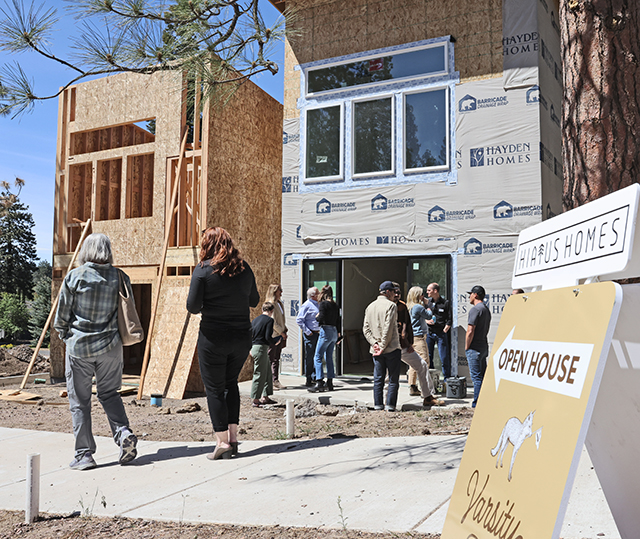Oregon wine industry prioritizes pollinators with Bee Friendly Wine
Published 7:45 am Monday, June 26, 2023

- Corinne Gosnell, head gardener at Stoller Family Estate, shows one of two new mason bee houses kept in the winery’s small orchard. Approximately 1,500 mason bee cocoons emerged during this past spring, Gosnell said.
DAYTON — Native shrubs and bushes surround a grassy amphitheater outside the Experience Center at Stoller Family Estate, where Corinne Gosnell paused to watch a brightly colored swallowtail butterfly flutter gently among the flowers.
Gosnell, the winery’s head gardener, describes this area as a “perennial jeweled ring,” decorated with plants that blossom for 10 months out of the year.
Not only do they look nice and fill the air with a sweet fragrance for visitors sipping Pinot noir and Chardonnay, but they also provide an oasis for hundreds of bees and pollinator insect species that call the Willamette Valley home, she said.
“When you’re here on a clear day, it is covered in every type of bee, moth and butterfly,” Gosnell said. “It really is remarkable.”
Nestled in the Dundee Hills near Dayton, Stoller Family Estate is one of a dozen Oregon vineyards participating in a collaborative new program called Bee Friendly Wine, promoting biodiversity and habitat for pollinators.
Bee Friendly Wine started as a pilot project last year, building on one-of-a-kind research by Oregon State University and citizen-scientists working to compile an inventory of bee populations statewide — known as the Oregon Bee Atlas.
Andony Melathopoulos, pollinator health specialist for OSU Extension Service, said vineyard managers can use the Bee Atlas database to learn more about bees in and around their properties, and then cross-reference which plants are best to attract those species.
Oregon has more than 700 species of wild bees statewide, according to OSU.
“We know everybody is pinched for time and money,” Melathopoulos said. “This tool will make sure that when people do decide to make an investment, it’s going to be a good one.”
Both the USDA and state Department of Agriculture have awarded grants to pay for Bee Friendly Wine tours, where the public can see what wineries are doing to support native pollinators and how they can help bees at home.
Upcoming tours are scheduled for Aug. 19 at King Estate Winery near Eugene, and Sept. 17 at Stoller Family Estate.
Melathopoulos said wineries are perfect for these events, because they have already developed close relationships with their members.
“A lot of them are conservation-minded,” he said. “That’s what’s really motivating a lot of this.”
The program has also partnered with two West Coast-based nonprofit organizations that certify bee-friendly farming practices, including Pollinator Partnership and LIVE — which stands for Low-Input Viticulture and Enology.
“We wanted to get more of our growers recognized for the work they are doing,” Melathopoulos said.
Stoller Family Estate is already certified through LIVE and as a B corporation for “social and environmental performance.” In addition to habitat and biodiversity, the criteria for LIVE certification emphasizes energy efficiency and reducing chemical inputs, such as spraying pesticides.
Gosnell, 62, was hired by the winery in 2019. A self-taught horticulturist, she has spearheaded several projects over the last four years to benefit pollinators.
The “jeweled ring” was planted in early 2020, incorporating a diverse mix of plants including azaleas, mock orange, heirloom roses, lilies, sage, Salvias, Nepeta and Asters.
Within a short walking distance lies a four-acre meadow of perennial and annual flowers mixed with tall grasses, accentuated by a stately oak tree in its center. Beyond that, a hedgerow planted in 2021 marks the estate’s eastern boundary, providing additional bee and pollinator habitat.
Gosnell has also started a mason bee production and management program, working with Stephen Paisley, a beekeeper and volunteer enthusiast who lives in Salem. Together, they built two new mason bee houses in the winery’s small orchard, which boasts nearly 30 different fruit trees.
About 1,500 bees emerged from their cocoons this past spring — an overwhelming success, according to Gosnell.
“They are one of our most profound pollinators,” she said. “It’s a very complex management process, however the commitment to do it is worth every ounce of effort.”
Pollinators are a critical part of food production, Gosnell said. She believes more farms and ranches have recognized the value of biodiversity and preserving natural spaces on their land, calling it a “thought revolution” within agriculture.
“It is resoundingly rewarding to participate in something that is for the future,” she said. “Little baby steps can make a big difference.”
Started: 2022
Purpose: Improving habitat on Oregon vineyards for native bees and pollinators
Funding: Approximately $180,000 in grants provided by the USDA Western Sustainable Agriculture, Research and Education program, and Oregon Department of Agriculture’s Specialty Crop Block Grant program
Wineries: 12 enrolled, including:
• Domaine Willamette
• Sokol Blosser Winery
• Stoller Family Estate
• Remy Wines
• Winter’s Hill Estate
• Abbott Claim Vineyard
• Monksgate Vineyard and Wines
• Montinore Estates
• Soter Vineyards
• Walnut Ridge Vineyard
• Kings Estate Winery and Vineyard
• Willamette Valley Vineyards






